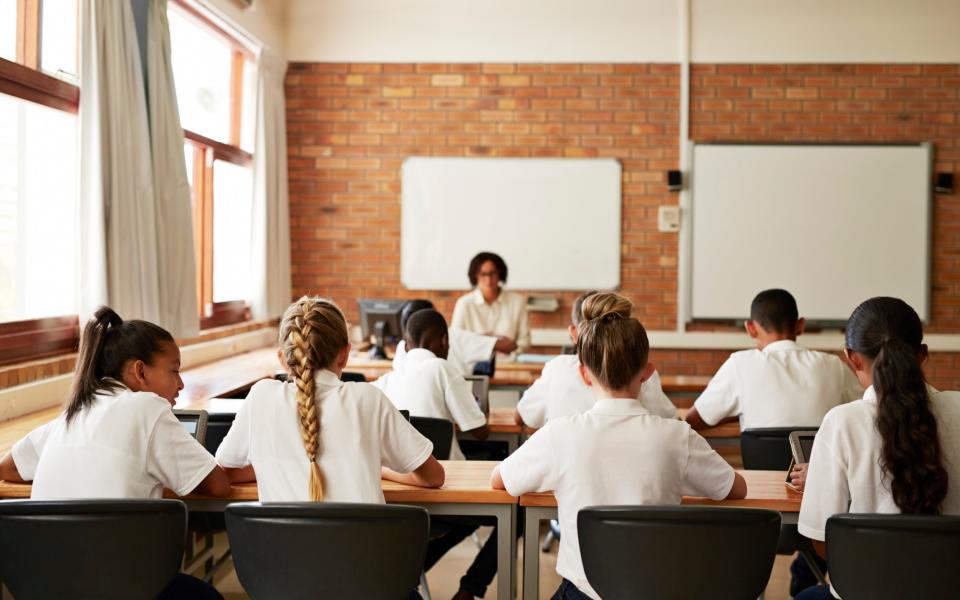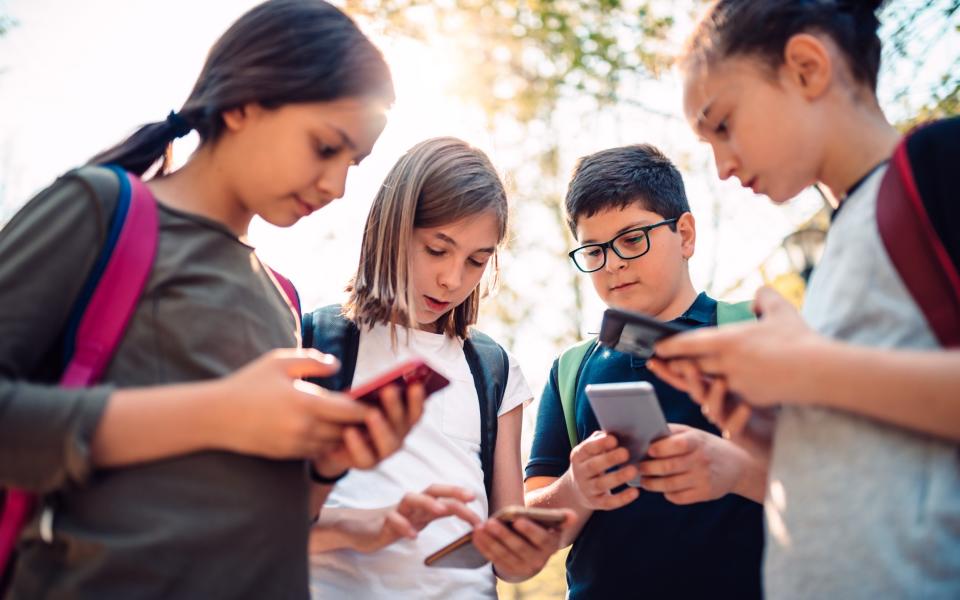‘Endless tech’ at schools has been a failure, says Sophie Winkleman

Schools have “gone crazy” filling classrooms with screens and results will go down as a result, the actress Sophie Winkleman has warned.
The campaigner, 43, wants iPads removed from classrooms and the hundreds of millions of pounds spent by UK schools every year on education technology invested in teachers instead.
Speaking to The Telegraph, she said that schools should be a “safe haven” from screens for children.
Research from technology regulator Ofcom this week showed that a quarter of children under seven have their own smartphone, while 32 per cent of children aged eight to 17 had experienced something “nasty or hurtful” online in the past year.
Winkleman, who is married to Lord Frederick Windsor, second cousin to the King, has spent four years researching the impact of screens on children and is alarmed by what she has seen on school visits in her role as patron of the charity School-Home Support.
“I’m very concerned about tech for tech’s sake,” she said.
“It’s especially rampant in independent schools, where many heads have gone crazy for filling the classroom with screens. Perhaps they think it’s a progressive and attractive look to prospective parents?
“Maybe it is, but it’s their job to educate parents on the superior nature of books, handwriting and deep thinking.”
UK schools spend around £900 million a year on education technology, according to the Department for Business and Trade.
At private schools such as Eton College, pupils can be found learning from digital textbooks and quizzing apps, while using digital notebooks and Apple pencils to draw or write on a screen.
Meanwhile, tablets are available for pupils to use in the majority of state schools in England, according to a Government survey.
The “digitisation” of education in schools is gaining pace, with the exam board Edexcel starting to allow pupils to type essays in English Literature and English Language GCSEs.
Pearson, the company that runs Edexcel, hopes to be able to offer an on-screen option for all GCSEs by 2030.

Private schools are recruiting digital tsars to help them embed artificial intelligence into their teaching through tools such as “personal AI tutors” for pupils.
So-called “edtech” products are “simply not proven yet”, Winkleman said. “In fact, results and progress have been descending since they’ve been in use. I believe that’s why exams are now going online, because schools can’t bear to say, ‘OK, this hasn’t worked’. So education advisors are lowering the rigour expected in exams to match falling levels.”
A Unesco report on technology in education last year found there was “little robust evidence on digital technology’s added value to education”.
In the UK, 7 per cent of education technology companies had conducted randomised controlled trials, while only 12 per cent had used third-party certification. Unesco noted that a great deal of evidence on technology education comes from those trying to sell it.
Winkleman cited research by Prof John Jerrim of University College London which found that pupils tend to do worse in reading, maths and science assessments when they are completed on a computer, compared with on paper. Other academics have found that when people read on a screen, they tend to skim more than when reading from a book.
Last year, ministers in Sweden announced plans to reverse an earlier move by the government to make digital devices mandatory in pre-schools after children’s reading test scores fell between 2016 and 2021.
“There’s clear scientific evidence that digital tools impair rather than enhance student learning,” said Sweden’s Karolinska Institute, a world-renowned medical university.
‘This digital thing is a mistake’
Winkleman said that while she accepts that a small number of digital tools could aid learning, the UK should follow Sweden in largely returning to books, pen and paper. “They’ve done it in Sweden – they’ve said, OK, this digital thing has cost us beyond fortunes but it’s a mistake.”
She said that some head teachers who “went for tech in a big way, thinking they were being quite Silicon Valley” will not yet accept that tech in classrooms hasn’t transformed pupil outcomes.
Winkleman studied English Literature at the University of Cambridge and has appeared in the Channel 4 comedy Peep Show, ITV period drama Sanditon and the recent Wonka film. She has two daughters – Maud, 10, and Isabella, eight – who she has moved to different schools twice to get them away from iPads in classrooms.
“I was quite a lone voice in the classroom then, saying I don’t want them to be given iPads, even if you’re being really generous, please don’t,” she said. “So I just trotted around trying to find fairly traditional schools nearby. But the schools I visited around the country, where tech is used in serious moderation, are so visibly much more successful and happy and effective than the schools who’ve gone full on tech.”

The actress is a leading voice in a growing movement against children’s access to the social media apps found on smartphones and tablets. Since February, tens of thousands of parents have joined a grassroots movement, Smartphone Free Childhood, launched to support each other in delaying giving their children such devices.
Winkleman worries that devices such as tablets in schools and online homework risk children being in an environment where they cannot escape screens. “Children should come home, be rid of those stupid screens and handwrite their homework,” she said.
“Handwriting delivers information into the brain more profoundly and it calms children down. It lets them think. It’s very agitating being on a screen, it’s not how we want our children to think or to learn.”
She added: “I think teachers need to be helped and supported and paid more, and I am angry that so much money has been spent on the wrong tools, instead of the only tool we need in the classroom which is a great teacher.”
Molly Kingsley, of Safe Screens Campaign, a parent-led initiative which wants the Government to restrict smartphone use for under-16s, said: “The rapid increase in usage of personal screens in school has been a financial bonanza for tech companies – but the evidence that they are beneficial for children and education is simply not there.
“Indeed, increasingly the evidence shows that reading on paper gives deeper comprehension and learning than screen-based learning. Coupled with the fact that pupils are increasingly able to outwit the devices to enable them to spend their lesson time surfing the internet, there needs to be a moratorium on increasing screen-based learning until an evidence-based risk assessment which puts children’s safety and long-term education at its heart.”
A Department for Education spokesperson said that England has “a world-class education system where primary children are the ‘best in the west’ at reading”.
They added: “Technology is there to support teachers, and the vast majority agree it does. Our exploratory work on AI also suggests it could further reduce the amount of time teachers spend doing administrative tasks, so they can focus on what they do best – teaching and supporting their pupils.”

 Yahoo News
Yahoo News 
